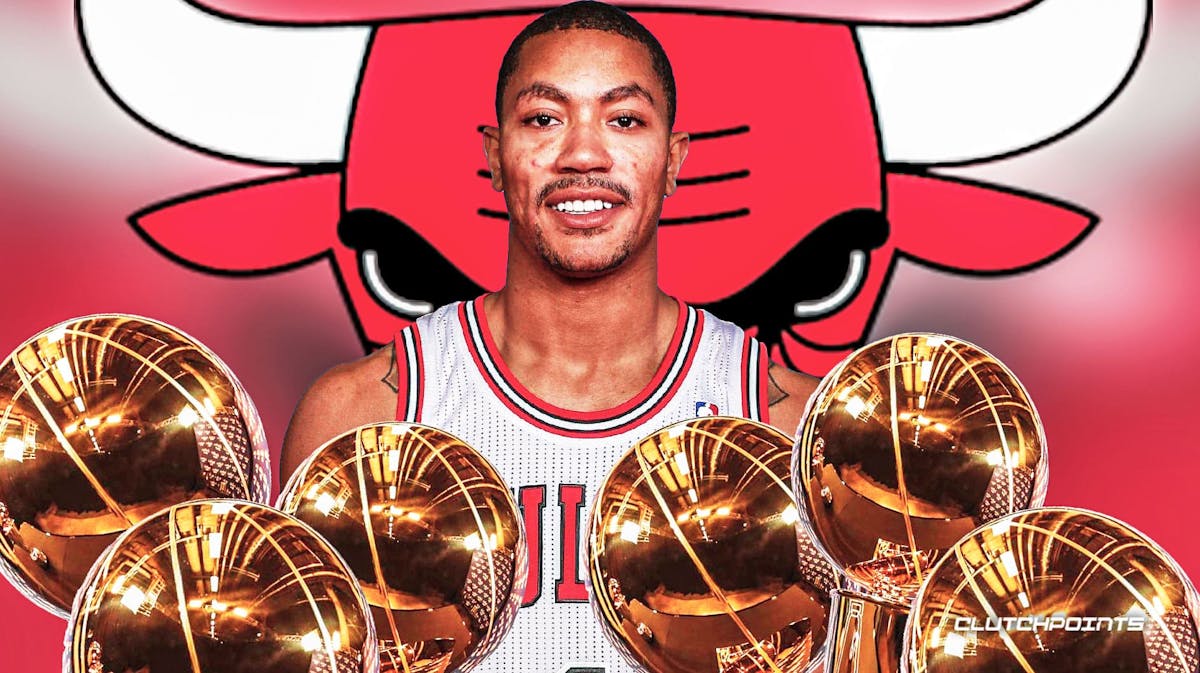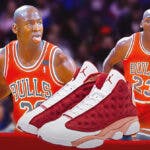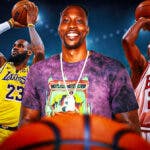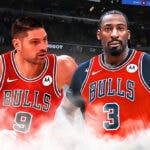The Chicago Bulls' dynasty in the '90s was the among the greatest displays of dominance in the history of team sports. Led by Michael Jordan and Scottie Pippen, there were other Chicago legends that contributed in huge ways to the story of this franchise. So who are the greatest Bulls players ever?
Let's rank them 1-10. Spoiler alert, MJ tops the list, but who else cracks the top five?
10. John Paxson
John Paxson is remembered for his clutch perimeter shooting in the first half of the Bulls' dynasty. Most notably, Paxson hit a championship-winning three-pointer in Game 6 of the 1993 NBA Finals. Down two points to the Phoenix Suns in the closing seconds, Paxson drilled the jumper to give Chicago the lead and its third consecutive championship.
Paxson played nine seasons for the Bulls and won three championships as a key role player. He played all 82 regular season games in three separate years as a Bull, and he was an every day starter for four seasons, including on the first two championship teams.
After his retirement, Paxson also joined the Bulls' coaching staff for the 1995-96 season, when the Bulls won 72 games and their fourth championship, in Michael Jordan's first full season back from his own retirement.
Paxson only averaged double digits in scoring twice during his career, but his contribution to three championship runs with the Bulls and his iconic title-winning shot land him on the list.
9. Bill Cartwright
Bill Cartwright was the starting center for the Bulls during the first three-peat. He played six seasons with the Bulls and didn't put up special numbers, but his role on those three championship teams was quite important.
Cartwright also joined the Bulls coaching staff ahead of the 1996-97 season and won two more championships as an assistant coach. He eventually became the head coach of the team in the post-Jordan rebuilding phase, but the team struggled in the absence of talented players
8. Jerry Sloan
Jerry Sloan was one of the first players to play in a Bulls uniform; the team selected Sloan in the 1966 NBA expansion draft. Sloan had a successful career in Chicago, becoming a two-time All-Star and earning the moniker “the Original Bull.”
Sloan was a strong defender, making six All-Defensive teams as a Bull. He joined the Bulls coaching staff after his retirement and later became the head coach. He went on to coach the Utah Jazz for 23 years
The Bulls retired Sloan's number, the first number retired by the franchise.
7. Bob Love
In the nine seasons Bob Love played for the Bulls, he averaged 21.3 points and made it to three All-Star games. Two of those seasons, he averaged over 25 points per game. Love played alongside Sloan for most of his career and also had two All-Defensive selections of his own.
The Bulls also retired Love's number, the second number retired by the franchise.
6. Artis Gilmore
Artis Gilmore arrived in Chicago following the NBA-ABA merger. His career began with the the Kentucky Colonels, where he put up monster numbers and made five All-Star selections in five years. He actually won the league's MVP award in his rookie year. However, the Colonels were not absorbed by the NBA as part of the merger, so Gilmore went into the ABA dispersal draft, and the Bulls picked the 7-foot-2 big man first overall.
Gilmore ended up playing six seasons for the Bulls, averaging marks of over 20 points, 11 rebounds and two blocks throughout that time. He made four All-Star games and one All-Defensive team.
He returned to the Bulls late in his career, but he was no longer an effective player, and Chicago released him in the middle of the 1987 season.
5. Derrick Rose
The story of the Chicago Bulls, much like the story of basketball, is incomplete without Derrick Rose's accomplishments. Rose's first four seasons in the NBA were spectacular. He won the 2009 Rookie of the Year award and was an All-Star by year two, dominating the game with elite vertical athleticism. In year three, he averaged 25 points and 8 assists and won the MVP, becoming the youngest MVP in NBA history at just 22 years old.
Rose's potential was amazing given his production at such a young age. That, paired with the success the Bulls were seeing for the first time since the Jordan years, quickly made Rose the most beloved Chicago athlete.
Sadly, Rose's ascension to the top of the NBA was cut short by devastating knee injuries. When Rose tore his ACL in the first round of the 2012 playoffs, he was coming off his third straight All-Star campaign and his Bulls were the No. 1 seed in the Eastern Conference.
Rose was never the same, as the knee injuries continued to pile up after the first one. However, those early 2010s Bulls teams were exceptionally fun to watch, and Rose's brief stint as the league's most electrifying player will never be forgotten.
4. Dennis Rodman
Many associate Dennis Rodman with the Detroit Pistons more than the Bulls, but Rodman's contribution to Chicago's second three-peat in the 90s can't be overlooked. Rodman's statistical production aside from rebounding is nothing to write home about. He averaged just over five points per game in the three playoff runs that the Bulls won championships. However, he did lead the league in rebounding in each of those seasons.
As controversial a man as Rodman was, the Bulls couldn't have done it without him. Rodman's defensive prowess and rebounding capabilities were extremely valuable to fill the hole left by Horace Grant's departure.
Rodman's on-court contributions and his legacy as a key part and one of the faces of the Bulls dynasty forever cement him in the history of this franchise.
3. Horace Grant
The Bulls drafted Horace Grant 10th overall in the 1987 NBA draft. He took over as the starting power forward in year two and averaged 13 points and nine rebounds across six seasons as a starter.
Grant was the third best player on the Bulls first three championship team. He was Chicago's leading rebounder and held it down defensively on the interior, earning an All-Defensive selection. He helped the Bulls secure their third championship with a last-second block on the Suns' Kevin Johnson, right after Paxson's three-pointer.
Grant's role increased the following season after Michael Jordan retired, and he made his only NBA All-Star Game, averaging career highs in points (15.1), rebounds (11.0) and assists (3.4.)
That would be Grant's final season with the Bulls, as he left in free agency to join the Orlando Magic.
Grant was the most statistically productive player outside of Jordan and Pippen across the entire Bulls Dynasty. His contribution to the first three championships and the length of his time in Chicago make him the third greatest player in Bulls history.
2. Scottie Pippen
Scottie Pippen was Michael Jordan' wingman and the Bulls' other perennial All-Star throughout the dynasty. Pippen was one of the greatest defenders of all time, and he was the Bulls' second leading scorer. He made seven All-NBA teams and 10 All-Defensive teams.
Jordan's dominance was already apparent by the time the Bulls drafted Pippen in 1987, just five picks before they selected Horace Grant. Jordan averaged 37 points per game in the 1986 season, but the Bulls lacked meaningful playoff success, being swept in back-to-back years by the Boston Celtics.
Pippen's arrival and development into a star player eventually gave Jordan the help he needed to start winning titles. He was the No. 2 option on all six championship teams and played a total of 12 seasons with the Bulls.
There's not much else to say about Pippen. It was the Jordan/Pippen duo, and Jordan couldn't have done it without him.
1. Michael Jordan
Obviously, the greatest basketball player of all time is the greatest Bull of all time. Six championships, six Finals MVPs, five regular season MVPs, a Defensive Player of the Year award, 10 scoring titles, 11 All-NBA selections nine All-Defensive selections, etc…
Jordan accomplished as much as anyone else who's ever played the sport and his level of individual dominance was unbelievable. Jordan averaged 31.5 points across 13 seasons on the Bulls and 33.4 points in the playoffs. He was the most revered athlete in the history of the sport and on his best day, there was simply no beating Michael Jordan.
Magic Johnson and Larry Bird revived and popularized basketball in the 80s, and Jordan and the Bulls took it to whole new heights. Jordan's cultural impact and international superstardom exceed that of any other athlete in the history of American sports.
Jordan was the ultimate competitor and was by far the best player in the NBA for the entirety of his career with the Bulls. He is the greatest Bull and the greatest basketball player to ever do it.




